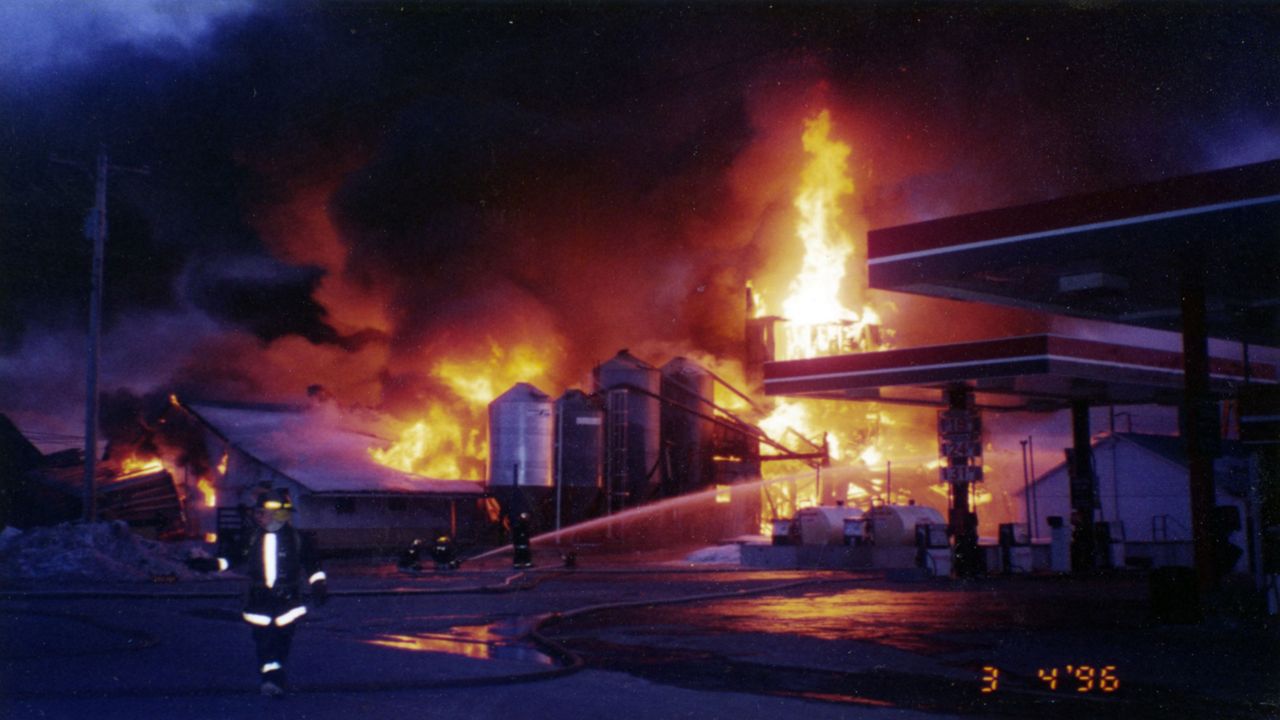WEYAUWEGA, Wis. – We’re not supposed to forget our heroes. But 25 years ago, the heroes themselves, the ones that helped save the city of Weyauwega, they couldn’t wait to forget.
A train derailment, 469,000 gallons of burning propane, and 14 days wondering if this day would be their last; they didn’t want to be heroes anymore. They stared death in the face, and it wasn’t pleasant.
“They had a large number on their staff quit and they went on to other occupations,’’ said Jim Baehnman, Weyauwega’s assistant fire chief, said of the site crews from Green Bay, Texas, and Missouri who were brought in to mitigate the situation.
“They were very, very, very concerned that they had just dodged the biggest bullet of their life.”
By all accounts, every one of them was lucky to be alive. By all belief, the hand of God touched them all.
“Why it didn’t explode that morning, there is really no explanation whatsoever,’’ says Jim. “Everybody that I talked to during the entire evacuation event indicated to me it likely should have happened that very morning. You and I should not be talking on the phone right now, and I should not be here.”
****
It was about 5:45 a.m. on March 4, 1996, when the thunderous crash made Judy Wiesman sit up in her bed. She immediately got up and opened the bedroom drapes.
“I saw this big orange glow which looked like a huge fire,’’ she said.
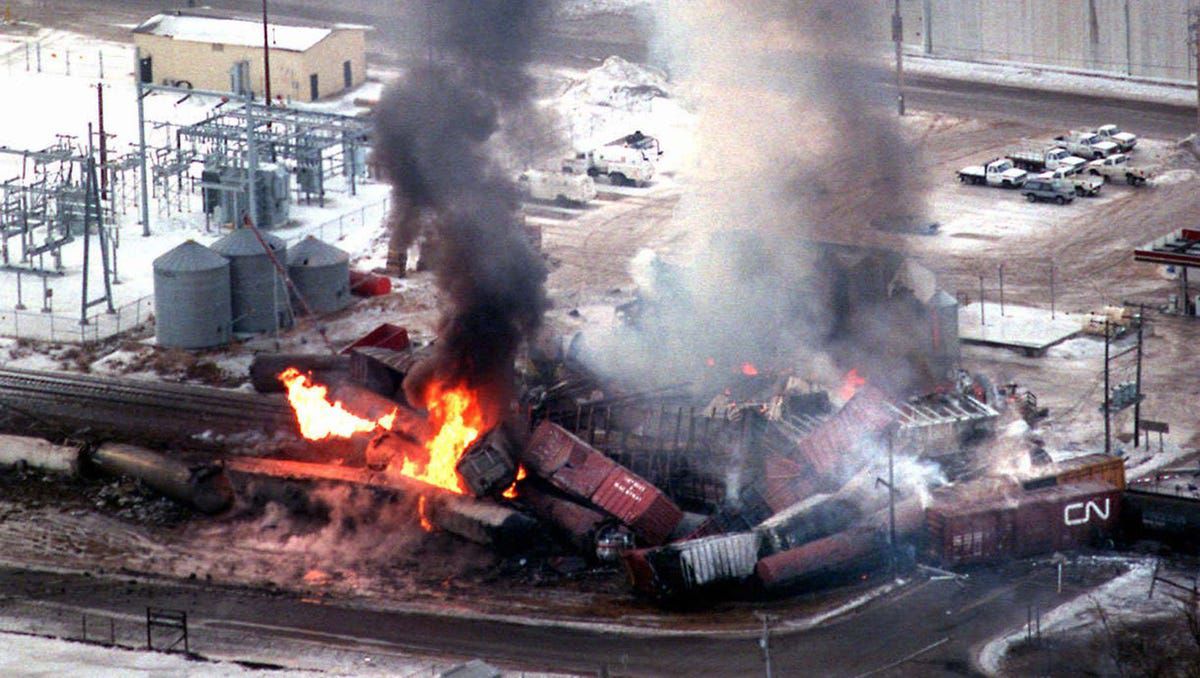
As the second term mayor, who also doubled as a photojournalist for the Appleton Post-Crescent newspaper, she immediately grabbed her camera, headed out the door, and drove toward the orange ball.
“And when I got there what I saw was very disturbing,’’ she said. “It looked to me like someone had piled up some toy train cars and lit them on fire. That was my first impression. They were all piled up and burning.”
Concerned to get any closer, she returned home to call the paper to tell them what she saw and to send reporters to the scene. But that call was never made. Her phone line was dead, her home’s electricity was lost and a Waupaca sheriff’s car was nearby about to tell residents they had 5 minutes to evacuate their homes.
“I guess you could say I put on my mayor’s cap at the point,’’ says Judy. “I walked out the door and never went back for 21 days. (I grabbed) my purse, my camera, and my husband, that was it.”
A Wisconsin Central freight train, with 37 cars, had derailed. Sixteen of those were tank cars, 14 filled with liquefied petroleum gas (LPG), and two with sodium hydroxide.
With fire crews on the scene unable to put as much as a small dent into containing the fire, and with a manifest obtained from the railroad, it took Jim just 45 minutes to understand they had to abort fighting the fire and begin to immediately evacuate some 2,200 residents, involving 600 to 700 homes and businesses, including two nursing homes.
“Some of the information I was getting about the potential of the explosion and the size of the explosion and the effects of the explosion were just phenomenal, just astronomical,’’ said Jim. “I could not believe what I was reading.’’
The concern was the possibility of a BLEVE (boiling liquid expanding vapor explosion), which occurs when the pressurized liquid inside a vessel, like the propane tanks that derailed, reaches temperatures higher than that liquid’s boiling point. If the train cars could no longer contain the pressure inside of the sealed tanks due to the high temperatures, they would mechanically fail, causing an explosion.
They were, in essence, sitting on a bomb.
“Had that explosion happened,’’ said Jim, “the size of that explosion would have removed Weyauwega from the map.”
****
One can only imagine what it must be like to have someone knock on your door in the early morning hours and tell you that you have only five minutes to leave your house with no idea what is happening and no instructions on where to go.
“We only gave people 5 minutes because we were very fearful we could have that explosion even during the course of the evacuation,’’ said Jim, who was in charge because Fire Chief Gary Hecker was on a Caribbean vacation cruise.
“So it was kind of a cluster in the beginning because people really didn’t know where to go, and we really didn’t know how to tell them. We had no idea how long it was going to be that they were going to be gone.’’
The concern of an explosion hung in the air around the cleanup operation. Fear had an unrelenting grip on every move that was taken and every decision that was made, knowing what the wrong decision would mean.
Site workers would report to the command center at 6 a.m. each day, and when they returned at 5 p.m., their routine never changed.
“The first thing they did was call their spouses to let them know they were still alive,’’ said Jim. “They did that every day, religiously.
“You have to keep in mind that these guys did this for a living. This is not the first time they did it. But because of the severity of the crash, because of the potential for a major, major explosion the likes of which nobody has ever seen … ’’
The problems Jim and his crew faced were not contained to the derailment. They had to shut down the natural gas line coming into town because it ran directly under the crash site, leaving hundreds of homes without heat in freezing temperatures. Electricity was lost in several other homes.
“Nothing could really be done because of the hazards of going into that area, nothing could really be done until the potential for an explosion was mitigated,’’ Jim said.
Another problem was the spring runoff from the Weyauwega millpond was running around the local dam, eroding the foundation. That required him to send in a team to manually open the floodgates because there was no electricity to the dam. Another crew had to be sent to shut off all the waterworks to the high school because it had no heat and the fear was the pipes would break and cause severe damage to the school.
“We had similar situations to that with other large structures we had to deal with,’’ Jim said. “Some we could, some we couldn’t. It all depended on their proximity to the crash site.”
And all of it took its toll.
“I can tell you people in the command staff, myself included, never felt stress like that, for that period of time, ever,’’ said Jim.
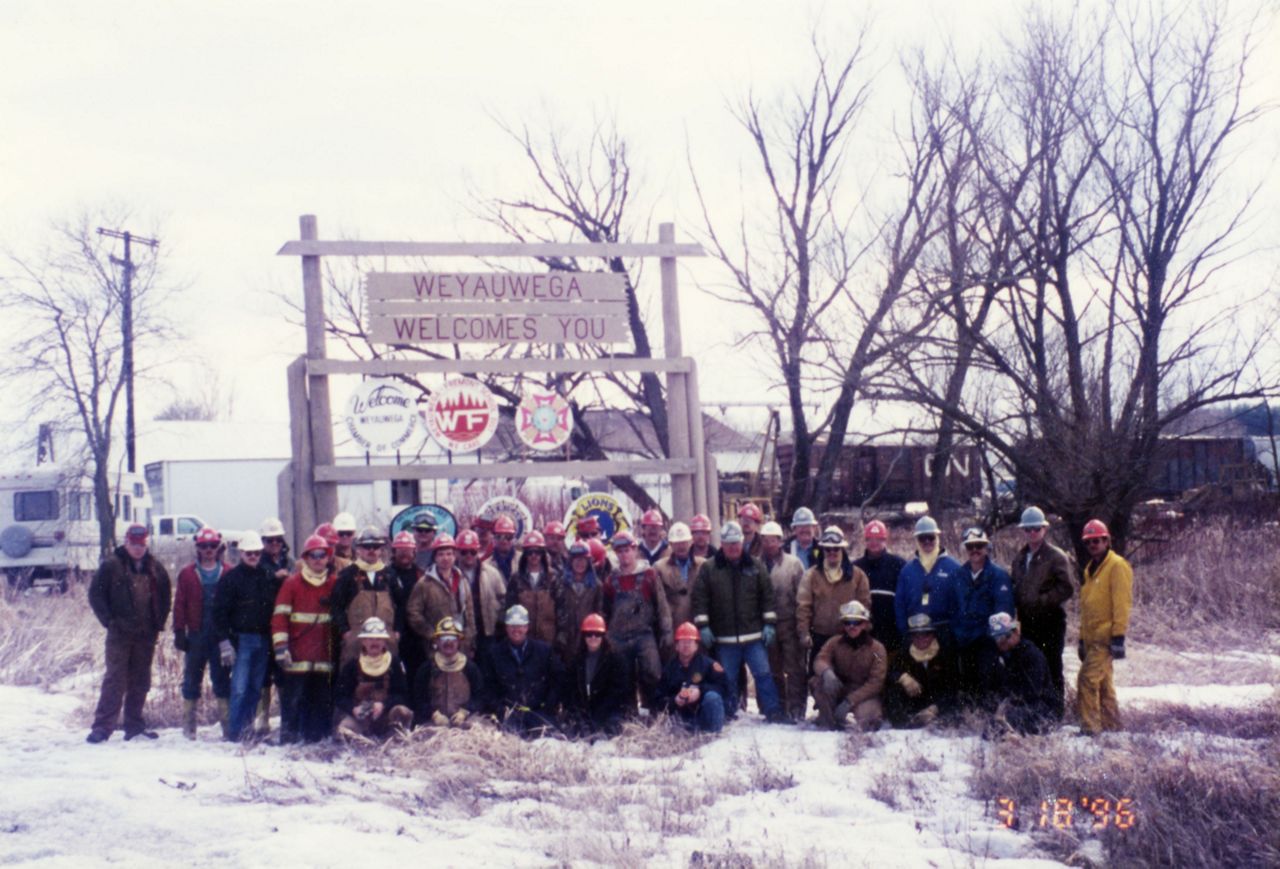
This from a man who served as a medic in Vietnam.
“I would say Vietnam was more stressful than this, only in the sense that Vietnam was for a year and this was only three weeks,’’ said Jim. “But yes, the three weeks rivaled Vietnam. It was very, very tough.’’
It got to a point where Jim sat down with his wife and explained their lives may never be the same again.
“I told her, ‘You know, we’ve got decisions to make here and some of these decisions might not set well and might not turn out good,’’’ said Jim. “And I said, ‘We may end up, if we get through this, we may have to leave town because nobody will like us when we get done.’’’
****
Richard Wagner got a call at about 6 a.m. that morning. It was his sister, telling him she thought the local Cenex gas station just blew up.
The gas station was right next to the co-op, which was right next to the cheese factory Richard owned with his cousin Robert.
“That got my attention,’’ said Richard.
But because his building was concrete, Richard wasn’t breaking a sweat.
“I didn’t worry too much about it starting on fire,’’ said Richard, “so I proceeded to take a shower and sit down and have breakfast.’’
But a short time later, when he saw the firetrucks whiz by him on his way to work, when he found out all his employees had to be evacuated, well, then he began to sweat – just a bit – and headed back home.
“When the firemen came by our house and with a bullhorn, they were telling us to evacuate immediately and they drove on down the road and we just closed the curtains and shut off the lights and tried to get them to think we were gone,’’ said Richard. “But that didn’t work, they came back. And they gave us 5 minutes to get out of the house.’’
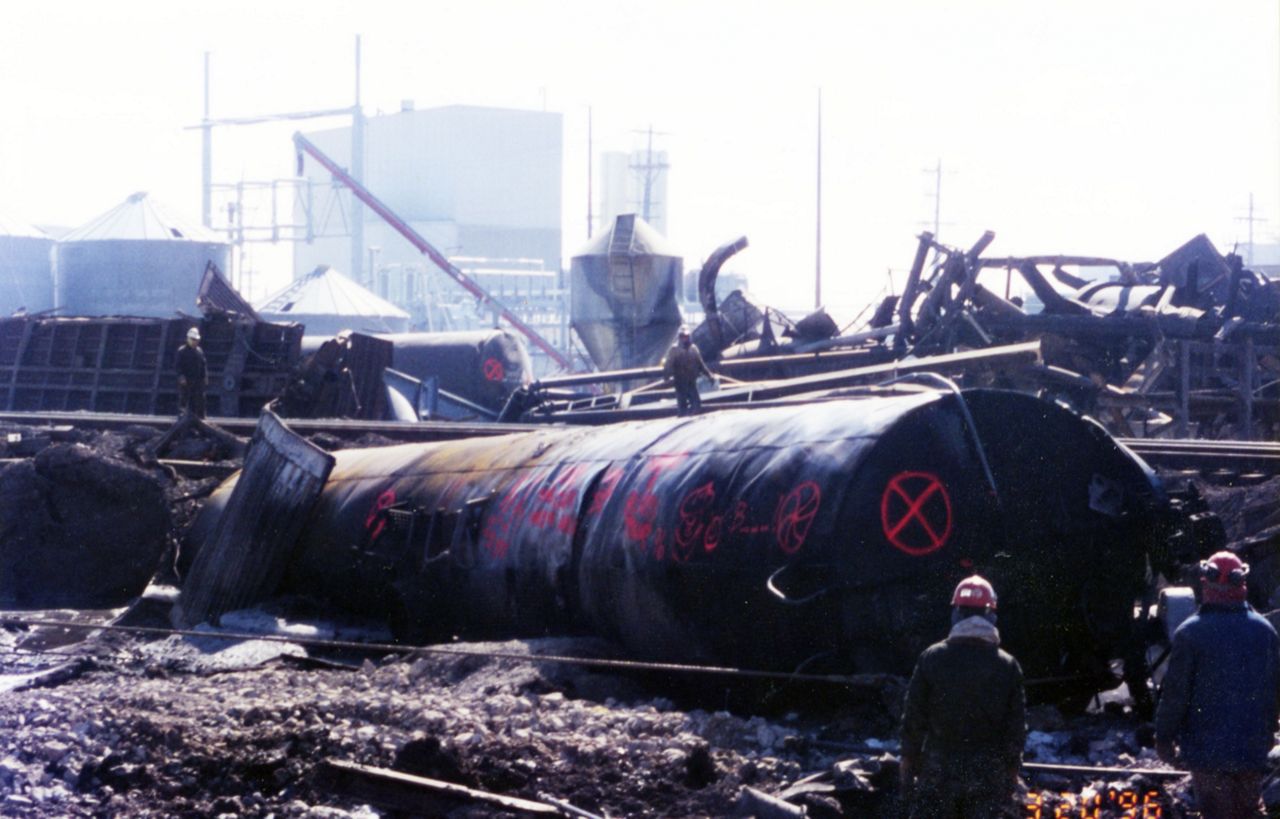
He moved in with his cousin and their task for the next 18 days was trying to keep their business afloat.
The milk business was very competitive in those days, and it was the perfect opportunity for his competitors to take advantage of his misfortune.
But they didn’t.
“Looking at it from a dairy farmer’s perspective, it was somewhat a seller’s market,’’ said Richard. “So to have all of our competition, geographically in the area, turn on a dime and set competition aside and say – it still gets me worked up – they would do whatever it takes to help us.
“Our major cheese supplier was Kraft Foods. We had started selling cheese to Kraft – how do you spell cheese, K-R-A-F-T, right? – we started making cheese for Kraft in the 1950s without a contract on a handshake basis. And this was 1996, and all of our cheese was being purchased by Kraft, and they called us up and said whoever takes in the milk from our patrons, we will guarantee to buy the cheese. Of course, that was very comforting and pretty well that got us over the hump you might say.’’
****
Because every fuel car was damaged, because it was too risky to pump the gas off of one car onto another and have it hauled away, the only solution was to simply let the propane burn itself out.
“I think the site crew in dealing with the entire problem, day after day wondering if that was going to be their last day on Earth, you really got to hand it to them,’’ said Jim. “They were a gutsy, nervy bunch of people. They did a phenomenal job of keeping their composure and mitigating the problem.”
But in the end, even these brave souls reached their limit.
“The very last day, when we had two propane tank cars left, one with 30% of fuel in it and one with 10% of fuel in it, there was an emergency evacuation of the site,’’ said Jim. “That was due to the pressure in the 30% car spiking from 75 pounds per square inch to 250 pounds per square inch in 3 minutes.
“They evacuated the scene and they came back and told me and the rest of the command staff, ‘We aren’t going back.’ They felt that it was just not going to happen.”
So the plan was to come up with a Plan B.
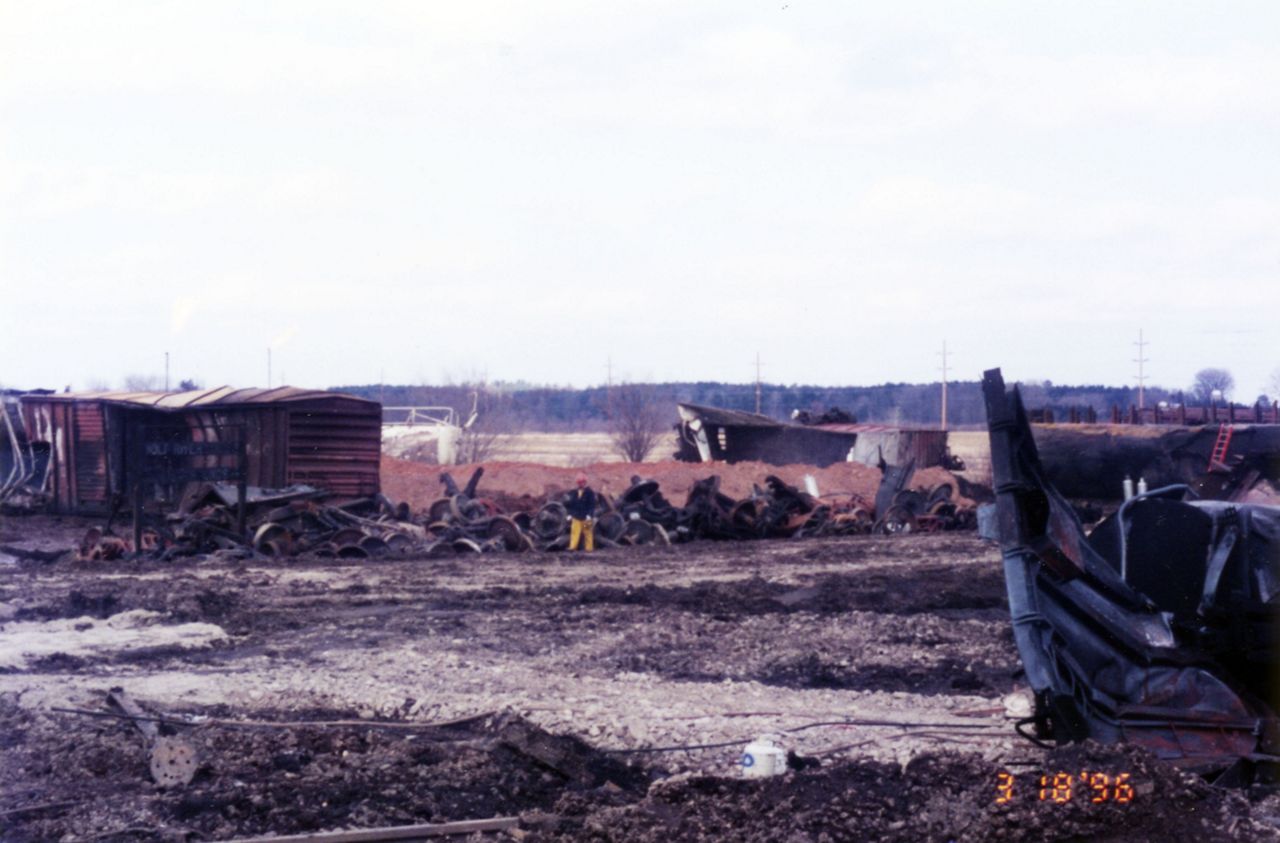
They decided they would contact an explosives expert they worked with in the past, a man named Billy from Louisiana who, because the train derailment had become a national story, was following the events from afar.
“They asked if he would consider coming up to help blow up these last two cars and he says, ‘I can come up and take a look. I don’t know what you guys got,’’’ said Jim. “So we made arrangements to get him up here, but before he got here, I asked the site crew foreman, 'What if Billy can’t do what needs to be done?'”
That’s when Jim first heard about Plan C.
“He said our last option then is to call in an aircraft strike and blow it up,’’ said Jim.
But Plan B proved to be a winner, as Billy was able to successfully blow up the last 40,000 gallons of propane.
It was over.
“Well, I’m not too proud to say I broke down and cried,’’ said Jim.
The joy the residents felt being able to return home was somewhat offset by what they found when they got there.
“The heat was off, people lost all their food, temperatures were very cold, there was a lot of water damage in some of the homes because of pipes breaking,’’ Judy said. “Coming home to that is not pleasant.”
But thinking about the alternative … this could have been an event that at the very least rivaled the Great Peshtigo Fire, where 1,500 people perished.
“After 25 years, I’m glad I’m still here for one thing,’’ said Judy. “I’m just very grateful it worked out the way it did.
“Our city could have been leveled. It just could have been horrible. … God was on our side that day, for sure.’’
****
Most of the heroes from those two weeks have started to fade from memory.
They saved a town. A national disaster was averted.
It’s not the way it’s supposed to be.
“I have grandkids and great-grandkids and they have no concept, no idea that anything like this ever happened,’’ said Jim. “There are a lot of people who were very young at that time; they don’t have any memories of what happened. And I attribute that to the fact that – while everybody was so fearful of that event at the time it was happening – it turned out to be safely handled. So it didn’t leave any marks on people’s memories.”
For the many heroes that would be good enough, for it meant a job well done.
Story idea? You can reach Mike Woods at 920-246-6321 or at: michael.t.woods1@charter.com



